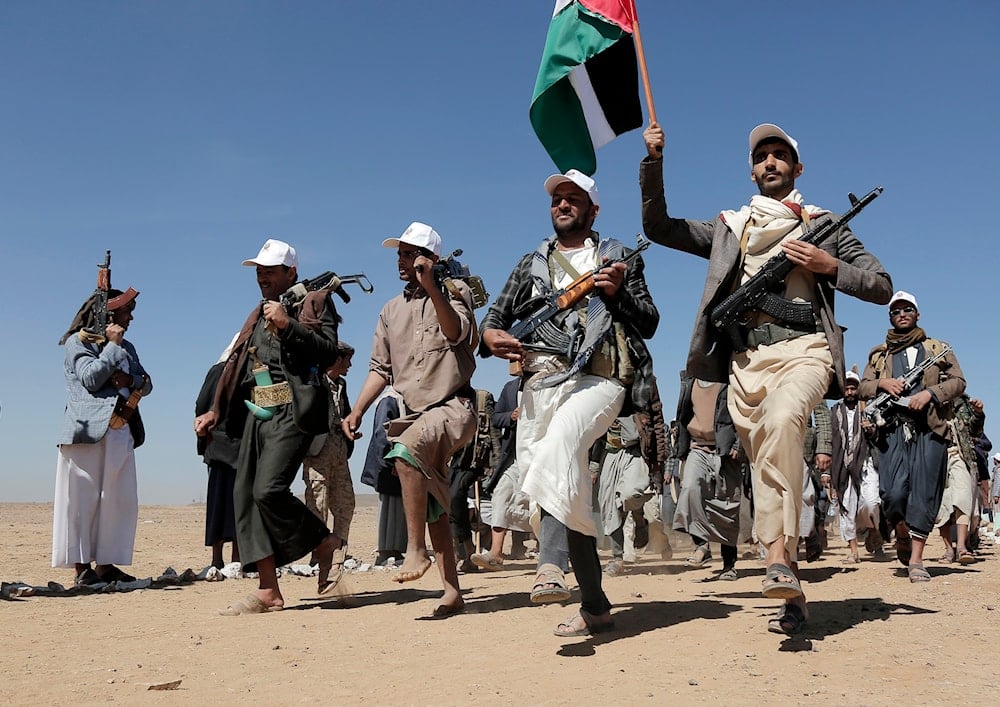Axis of Resistance definitely will respond to 'Israel', al-Houthi says
The leader of the Yemeni Ansar Allah movement stresses that the Israeli occupation will suffer the consequences of its inflammatory actions.
-

Ansar Allah fighters march during a rally of support for the Palestinians in the Gaza Strip and against the US strikes on Yemen outside Sanaa on January 22, 2024 (AP)
Yemeni Ansar Allah leader Sayyed Abdul-Malik Badreddine al-Houthi praised on Thursday the resilience of the Palestinian people in Gaza. Despite facing severe challenges, including genocide, displacement, starvation, and the repeated declaration of military zones, the Palestinian steadfastness was described by al-Houthi as a "significant lesson for the entire Muslim World."
In his address, Sayyed al-Houthi sharply criticized the broader Islamic world's response, noting that if hundreds of millions of Muslims had acted according to their responsibilities, "the crimes would have ceased, and the reality of the Palestinian people would have changed."
He condemned the al-Tabieen school massacre, highlighting it as the most heinous crime of the past week, where worshippers at the UN school were massacred using American-made bombs.
A strike utilizing three precision-guided bombs hit a large group of Palestinians performing dawn prayers on Saturday, killing at least 93 and injuring many others.
"Israel" claimed that the bombs killed 19 Palestinian Resistance members, weaponizing the claim as "justification" for killing another 74 people who were performing their internationally protected religious practices. The claim in itself was refuted by Hamas.
Arab regimes complicit
Sayyed Al-Houthi also pointed out that some Arab regimes are exerting all their efforts to "provide military protection for the enemy and intercept its targeted missiles or drones," while certain Arab media outlets have become "platforms justifying Israeli crimes and issuing moral support in its favor, challenging the nation."
On the issue of retaliation against Israeli aggression, al-Houthi emphasized that the decision to respond from the Axis of Resistance was unavoidable. He asserted that "no matter the efforts to contain the response, they will fail, and the decision is inevitable from all support fronts."
Sayyed al-Houthi explained that the United States was doing everything in its power to contain the response through political measures, including talks and negotiations and warnings about their impact. However, he affirmed that the US military buildup, which includes sending naval fleets and aircraft to American bases in Arab countries, would not deter the decision to retaliate.
He also dismissed the skepticism propagated by Israeli media, insisting that "the response is certainly coming," and urged people not to be swayed by doubt.
Addressing the delay in the response, the Ansar Allah chief clarified that it was a calculated move intended to inflict the most pain on the enemy, particularly in light of the American mobilization to impede it. He emphasized that this delay has had a "practical impact on the enemy," leading to unprecedented fear, such as the cancellation of flights.
Axis of Resistance shaking 'Israel' to the core
The Yemeni leader went on to affirm that the response was forthcoming and that the decision was final and irreversible. He described this as a "moral, human, and ethical obligation" and emphasized that it was a sincere commitment from those who have proven their honesty in word and deed, deeming it a necessary action to deter the enemy.
Moreover, he emphasized the significant role of support fronts in aiding Gaza, particularly highlighting the ongoing and escalating operations from the Lebanese front, which have had a noticeable impact on the enemy.
He noted that the entire Israeli occupation was in a state of panic and fear, with their media reflecting this reality, driven by the profound anxiety over a potential retaliatory strike from Hezbollah. Sayyed al-Houthi emphasized that Israel was "deeply concerned about Hezbollah's response, fearing it will be painful and significant."
The president of Yemen's Supreme Political Council in Sanaa, Mahdi al-Mashat, congratulated Lebanon on the anniversary of the 2006 war victory against "Israel", stating that "the historic victory achieved by the Islamic Resistance in Lebanon in 2006 will continue to serve as a beacon for all liberation movements."
Shifting focus to Yemen, al-Houthi revealed that Yemeni forces launched 15 ballistic and cruise missiles, along with drones, targeting ships this week. He assured that these operations would continue in support of Gaza. In contrast, US forces conducted 10 airstrikes this week, eight on al-Hodeidah and two in Hajjah and Sanaa.
Regarding Yemen's support for Palestine, al-Houthi highlighted the widespread military mobilization activities across most provinces, with over 400,000 people having completed military training programs.
He emphasized that the Yemeni people were unwavering in their support for Palestine, with "no political considerations or reservations," and vowed that as long as the aggression and blockade against the Palestinian people continue, Yemenis would persist in their military operations and popular activities as part of their sacred duty to resist.
Sayyed al-Houthi also affirmed the inevitability of responding to the Israeli attack on al-Hodeidah, stating, "The response is certainly coming, with its own trajectory, preparations, tactics, and dedicated capabilities."

 5 Min Read
5 Min Read








